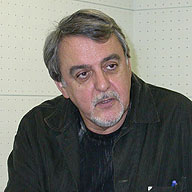An Interview with Alain Bergala
The Pleasure of Coming Face to Face with the Reality of the Real, at a Film Festival Overflowing with Humanity

Q: First, what are your overall impressions of YIDFF?
AB: I like to think I know a lot about all the different film festivals that are being held, in part because I myself make documentary films. From that perspective, first I’d say that films at YIDFF are screened under excellent conditions. The theaters are comfortable, and you don’t have to wait in long lines. Once you sit down, you get to watch films without any distractions.
In addition, not only are the works shown at YIDFF excellent, but also they come from many different cultural regions. From your seat you get a broad perspective of what is happening now in the world of documentary film, with a lot of films from the European and American blocks, and also from Asia.
Also, watching the fifteen films in competition you get to know the conditions currently developing within the world of documentary film. In particular, one trend that seems clear in many films screened at YIDFF is individual filmmakers putting themselves in their work, meaning filmmakers talk about their own feelings, things that actually happen to them, difficulties they encounter during the filming. In documentaries the filmmakers used to hide behind the subject of the work, but here they appear as observer or speaker. I think this is something happening throughout documentary film around the world.
Second is the importance of new equipment. By getting a compact camera, a filmmaker can create their own images and sounds all by themselves. Something new has emerged. Thanks to compact cameras, it’s possible to create works with a spirit different from the past. While it’s true they are clearly different from works shot in film, with a good projector these pieces can hold their own. And works made with new equipment like this are a different species from film. It’s become possible, for example, to do a nighttime shoot lit with a single candle. Before it was impossible to shoot a situation like this without a gigantic light, and you’re obviously going to lose the atmosphere and reality if you bring a device like that to the location. While of course the creator’s talent is essential, at YIDFF I discovered again that new equipment is bringing about something new within documentaries.
Also, it deserves special note that almost all the filmmakers come together for YIDFF. At other film festivals it’s unusual for filmmakers themselves to appear and talk with the audience. Unfortunately I didn’t get to talk with the filmmakers and hear their opinions, thinking that as jury president I couldn’t let the discussions influence my evaluation of the films.
Q: How was the management of the film festival?
AB: I think it is well organized. The reception was meticulous but also personable. And it is actually very convenient that you can walk wherever you need to go. You encounter people participating in the film festival in the streets and stores, gather at Komian at night and afterwards return to the hotel together. All the theaters are within walking distance. You don’t have to worry about how you’re going to get to the theater, like at Cannes. There isn’t any pretentious sociability, and everything takes place at a human scale. This is truly pleasant. And with all sincerity, I think it is wonderful that volunteers provide the support for this festival.
Q: What are your thoughts about documentary film?
AB: For me the most important criterion is the reality of the real. I understand there is a film and the filmmaker is trying to show something, but some works lack this reality of the real. On the other hand, there are works that within five minutes make you understand they have reality in the true sense of the word, the reality of the real, and the strange thing is you know right away. For example, and this is the same for extremely personal documentaries, but the important thing is the presence of this sense of reality within the shots, within the images. Since you are making a documentary, some kind of reality has to be captured and transferred onto the screen. If you can’t do that, you should do fiction. But strangely enough this reality doesn’t appear except through the medium of film. Great filmmakers have the ability to sink their teeth into this reality. And then this realism appears and comes out into the open. You can’t portray reality simply by putting the camera in front of an interesting subject. That just makes an imitation of reality. Shots existing just as shots are not a concept of reality. From within there, reality has to find life. Those are my thoughts on documentary film from a completely personal perspective, rather than as jury president.
Q: Finally, do you have any thoughts about the future of YIDFF?
AB: I think it is very important to continue protecting the way this film festival takes place now. YIDFF has become a festival with unity and an understanding about what it should be. I hope you continue preserving the festival’s authentic form, without getting caught up in journalistic success.
(Compiled by Abe Koji, professor at Yamagata University)
Interviewer: Abe Koji
Photography: Ogawa Tomohiro / Video: Matsunaga Yoshiyuki / 2003-10-15
